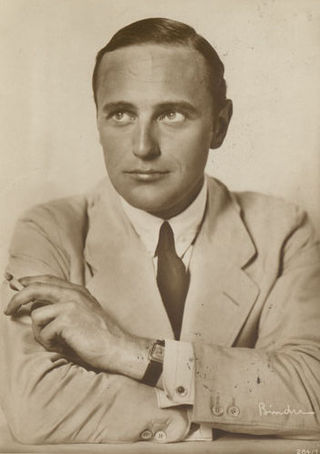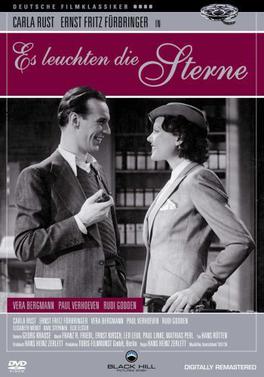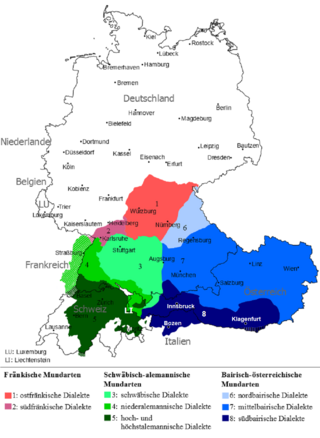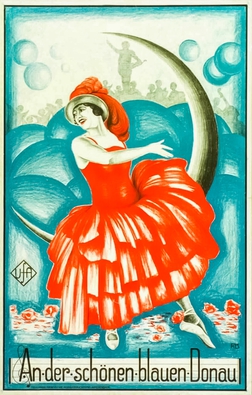
Joe May was an Austrian film director and film producer and one of the pioneers of German cinema.

Harry Liedtke was a German film actor.

The Stars Shine is a 1938 German musical revue directed by Hans H. Zerlett and written by Zerlett and Hans Hannes.

La Jana was an Austro-German dancer and actress.

Upper German is a family of High German dialects spoken primarily in the southern German-speaking area.

Betty Bird was an Austrian actress known for Die spanische Fliege (1931), Corazones sin rumbo (1928) and Sturm auf drei Herzen (1930). She was married to Gustav Ucicky until their divorce in 1936.
Robert Garrison was a German-Jewish film actor.

The Ufa-Palast am Zoo, located near Berlin Zoological Garden in the New West area of Charlottenburg, was a major Berlin cinema owned by Universum Film AG, or Ufa. Opened in 1919 and enlarged in 1925, it was the largest cinema in Germany until 1929 and was one of the main locations of film premières in the country. The building was destroyed in November 1943 during the Bombing of Berlin in World War II and replaced in 1957 by the Zoo Palast.
Max Reichmann (1884-1958) was a German film director active during the silent and early sound eras. Before making his own films, Reichmann worked as an assistant director on several E.A. Dupont productions. After graduating to directing, he directed the tenor Richard Tauber in several films following the introduction of sound in the late 1920s.
The Adventurers is a 1926 German silent adventure film directed by Rudolf Walther-Fein and starring Harry Liedtke, Erna Morena and Margarete Schlegel. The art direction was by Jacek Rotmil. The film was based on a novel by Rudolf Herzog. It premiered in Berlin on February 11, 1926.

The Blue Danube is a 1926 German silent romance film directed by Frederic Zelnik and starring Harry Liedtke, Lya Mara and Hans Junkermann. The film has been described as a paean to Austria. It was shot at the Staaken Studios in Berlin. The film's art direction was by Andrej Andrejew and Jacek Rotmil who designed the sets.
Der Ladenprinz is a 1928 German silent film directed by Erich Schönfelder, starring Harry Halm, La Jana and Paul Henckels and also with La Jana, Sig Arno and Hermine Sterler. It was adapted from a novel by Kurt Münzer. The film's art direction was by Andrej Andrejew.

A Modern Casanova is a 1928 German silent romantic comedy film directed by Max Obal and Rudolf Walther-Fein and starring Harry Liedtke, María Corda and Ernö Verebes. It was shot at the Staaken Studios in Berlin. The film's art direction was by Botho Hoefer and Hans Minzloff.

The Beaver Coat is a 1928 German silent comedy film directed by Erich Schönfelder and starring Ralph Arthur Roberts, Lucie Höflich and Wolfgang von Schwindt. It is based on Gerhart Hauptmann's play The Beaver Coat. It was made by the German subsidiary of First National Pictures. It was shot at the Staaken Studios in Berlin. The film's art direction was by Bruno Lutz and Franz Seemann.
The Hangman is a 1928 German silent film directed by Theodor Sparkuhl and Adolf Trotz and starring Andrée Lafayette, Bernhard Goetzke and Fritz Kampers.

Knights of the Night is a 1928 German silent film directed by Max Reichmann and starring Ivan Koval-Samborsky, Georges Charlia, and La Jana.

The Merry Widower is a 1929 German comedy film directed by Robert Land and starring Harry Liedtke, La Jana, Alice Roberts. The film's sets were designed by Robert Neppach.

The Hero of Every Girl's Dream is a 1929 German silent film directed by Robert Land and starring Harry Liedtke, Betty Bird and Hermine Sterler.
Karl Ottomar Treibmann was a German composer and music educator. From 1981 until his retirement in 2001, he was professor of music theory and Tonsatz at the Leipzig University. He was one of the representatives of modernity in the German Democratic Republic, whose great major works can be found in the areas of opera, symphony and chamber music.

The Rheinsberg Music Academy is an academy for music in Rheinsberg, Brandenburg, Germany. It was co-founded by Ulrike Liedtke and is now a national and state institution, educating both lay people and professionals. It is based at Schloss Rheinsberg and uses the theatre there for performances.














